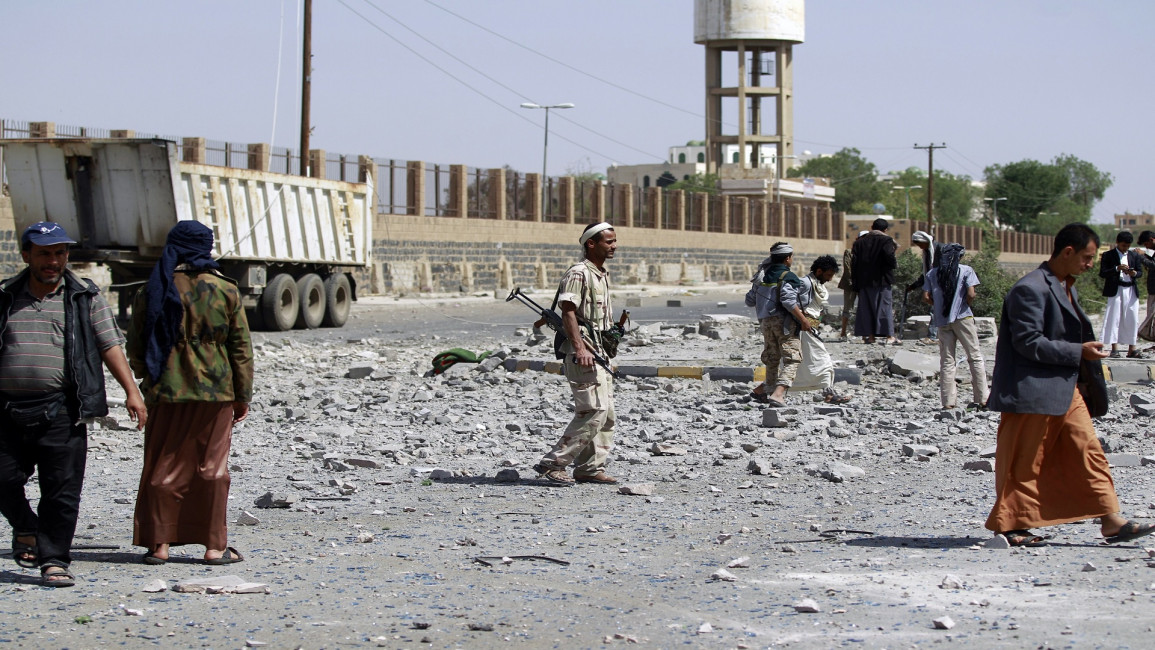Yemen's warring parties put conditions on Geneva conference attendance
Yemen's warring parties put conditions on Geneva conference attendance
The UN and the US are working fervently behind the scenes to ensure attendance by all sides - but conditions have been set.
3 min read
The UN hopes that the Geneva conference will find a resolution to Yemen's war [AFP]
Yemen's factions are all ready to attend the UN's proposed Geneva conference on June 14 to resolve the country's war - but they all have their conditions.
The UN's envoy, Ismail Ould Cheikh Ahmed, is attempting to ensure that all parties attend - including Yemen's exiled president, Abd-Rabbo Mansour Hadi, and his opponents, the Houthis and their ally, former President Ali Abdullah Saleh.
The Americans are also reportedly working hard in Oman to convince the Houthis to attend.
The Houthis have set their demands: $200 billion in compensation for Yemen from the Saudi-led coalition, whose airstrikes have left military and civilian casualties since March 26.
They don't just want monetary compensation however, with a request that will perhaps be more difficult for the Saudis - an apology and "admitting" the mistake of the operation in Yemen.
The Houthis also said that US requests for the group to stop infiltrating the Saudi border and attacking Saudi border towns were unacceptable.
A Houthi source told al-Araby al-Jadeed that the US delegation in Muscat's request was "virtually impossible... without the Americans expressing any commitment to halt the air raids of the Arab coalition in Yemen".
The US State Department had earlier confirmed that Assistant Secretary of State for Near Eastern affairs Anne Patterson had headed the US negotiating team in Muscat, which had been led by the US ambassador in Yemen, Matthew Tueller, before her arrival.
The virulently anti-American Houthi movement's delegation was led by their official spokesman, Muhammed Abdulsalam, along with Saleh al-Sammad, a Houthi leader who was also appointed a presidential adviser after a previous round of negotiations between the government and the Houthis.
It is also understood that the talks in Muscat were attended by leading southern Yemeni politicians, including the former president of South Yemen, Ali Nasser Muhammed, and Muhammed Ali Ahmed, who led the delegation representing the southern secessionist movement in Yemen at the Yemeni National Dialogue conference in 2013 before his early withdrawal.
The Houthis were not alone in setting conditions.
Hadi presented new conditions, al-Araby has learned, including that he be able to choose the government negotiating team himself.
His other condition, which could prove more hard to accept, is that there be a guarantee that peace-keeping forces, or Arab protection forces, be dispatched to Yemen in the event that an agreement result in his return - according to a prominent UN official who chose to remain anonymous.
Meanwhile, Saleh appears unlikely to attend. A leader in his General People's Congress (GPC) party noted that a number of party leaders living in the UAE made it clear that they are willing to go to Geneva to represent the GPC, but that, although Saleh is eager to lead his team, he is fearful of potential arrest in Switzerland.
Saleh is officially sanctioned by the UN Security Council.
This is an edited translation from our Arabic edition.
The UN's envoy, Ismail Ould Cheikh Ahmed, is attempting to ensure that all parties attend - including Yemen's exiled president, Abd-Rabbo Mansour Hadi, and his opponents, the Houthis and their ally, former President Ali Abdullah Saleh.
The Americans are also reportedly working hard in Oman to convince the Houthis to attend.
The Houthis have set their demands: $200 billion in compensation for Yemen from the Saudi-led coalition, whose airstrikes have left military and civilian casualties since March 26.
They don't just want monetary compensation however, with a request that will perhaps be more difficult for the Saudis - an apology and "admitting" the mistake of the operation in Yemen.
The Houthis also said that US requests for the group to stop infiltrating the Saudi border and attacking Saudi border towns were unacceptable.
A Houthi source told al-Araby al-Jadeed that the US delegation in Muscat's request was "virtually impossible... without the Americans expressing any commitment to halt the air raids of the Arab coalition in Yemen".
The US State Department had earlier confirmed that Assistant Secretary of State for Near Eastern affairs Anne Patterson had headed the US negotiating team in Muscat, which had been led by the US ambassador in Yemen, Matthew Tueller, before her arrival.
The virulently anti-American Houthi movement's delegation was led by their official spokesman, Muhammed Abdulsalam, along with Saleh al-Sammad, a Houthi leader who was also appointed a presidential adviser after a previous round of negotiations between the government and the Houthis.
It is also understood that the talks in Muscat were attended by leading southern Yemeni politicians, including the former president of South Yemen, Ali Nasser Muhammed, and Muhammed Ali Ahmed, who led the delegation representing the southern secessionist movement in Yemen at the Yemeni National Dialogue conference in 2013 before his early withdrawal.
The Houthis were not alone in setting conditions.
Hadi presented new conditions, al-Araby has learned, including that he be able to choose the government negotiating team himself.
His other condition, which could prove more hard to accept, is that there be a guarantee that peace-keeping forces, or Arab protection forces, be dispatched to Yemen in the event that an agreement result in his return - according to a prominent UN official who chose to remain anonymous.
Meanwhile, Saleh appears unlikely to attend. A leader in his General People's Congress (GPC) party noted that a number of party leaders living in the UAE made it clear that they are willing to go to Geneva to represent the GPC, but that, although Saleh is eager to lead his team, he is fearful of potential arrest in Switzerland.
Saleh is officially sanctioned by the UN Security Council.
This is an edited translation from our Arabic edition.



